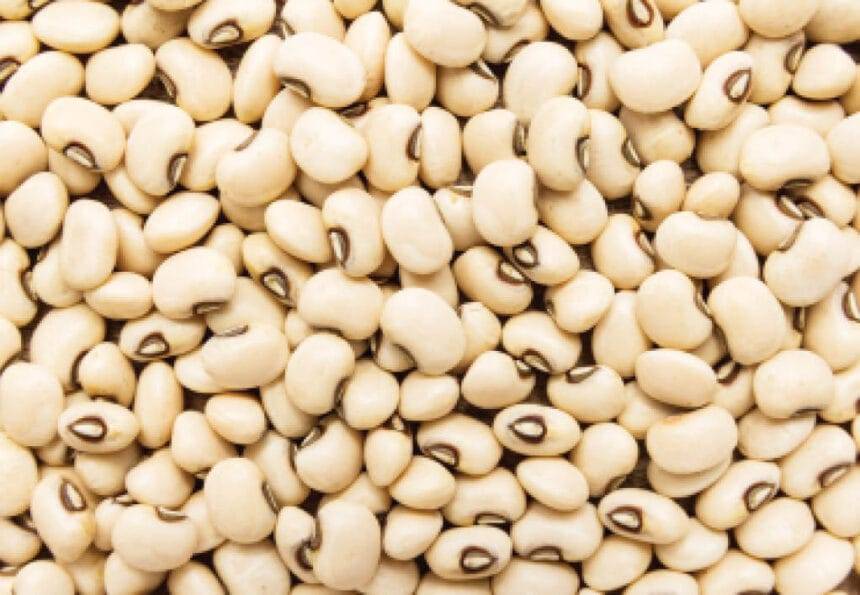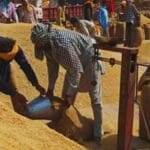Main Points In Hindi (मुख्य बातें – हिंदी में)
-
बीन्स की कीमतों में स्थिरता: विशेषज्ञों का मानना है कि नाइजीरिया में बीन्स की कीमतें जल्दी कम नहीं होंगी, मुख्यतः असुरक्षा, जलवायु परिवर्तन और उत्पादन में गिरावट के कारण।
-
नाइजीरिया की उत्पादन क्षमता में गिरावट: नाइजीरियाई निर्यात संवर्धन परिषद के अनुसार, नाइजीरिया कभी वैश्विक बीन्स का 58 प्रतिशत उत्पादक था, जो अब दस्यु गतिविधियों और किसान-पालक संघर्षों के कारण प्रभावित हो रहा है।
-
भंडारण समस्याएँ: खराब भंडारण सुविधाओं और अस्वास्थ्यकर भंडारण पद्धतियों ने बीन्स की उपलब्धता और खपत को नकारात्मक रूप से प्रभावित किया है।
-
सरकारी हस्तक्षेप की आवश्यकता: उद्योग के विशेषज्ञों का कहना है कि सरकार को बीन्स की उपलब्धता और किफायती कीमतों को सुनिश्चित करने के लिए मूल्य नियंत्रण प्रणालियों को लागू करने की आवश्यकता है।
- नाइजर से आयात पर प्रतिबंध: नाइजर गणराज्य द्वारा कृषि उत्पादों के निर्यात पर प्रतिबंध के कारण भी बीन्स की आपूर्ति प्रभावित हो रही है, क्योंकि नाइजर नाइजीरिया के कुछ हिस्सों में बीन्स की 45 प्रतिशत आपूर्ति करता है।
Main Points In English(मुख्य बातें – अंग्रेज़ी में)
Here are the main points of the article regarding the bean prices in Nigeria:
-
Rising Bean Prices: Experts warn that the prices of beans in Nigeria are unlikely to decrease soon due to multiple compounding factors.
-
Decline in Production: Nigeria, which was once the largest producer of beans (accounting for approximately 58% of global production), is experiencing a decline in output due to factors like insecurity, farmer-herder conflicts, and climate change.
-
Storage Issues: Poor storage facilities and unhealthy storage practices are negatively impacting both the consumption and availability of beans in the country.
-
Impact of Niger Republic: The Niger Republic has restricted the export of agricultural products to Nigeria, which has further strained the supply and contributed to the increase in prices. The exchange rate fluctuations between the Nigerian Naira and the West African Franc are also making it difficult for traders to import beans.
- Need for Government Intervention: There is an urgent need for the Nigerian government to implement effective price controls to regulate the availability and affordability of beans, especially in light of ongoing security challenges that discourage farmers from cultivating crops.


Complete News In Hindi(पूरी खबर – हिंदी में)
विशेषज्ञों ने चेतावनी दी है कि नाइजीरिया में बीन्स की कीमत जल्द ही कम नहीं होगी।
नाइजीरियाई निर्यात संवर्धन परिषद (एनईपीसी) के अनुसार, देश बीन्स का सबसे बड़ा उत्पादक हुआ करता था – वैश्विक उत्पादन का लगभग 58 प्रतिशत।
लेकिन दस्यु, किसान-पालक संघर्ष और जलवायु परिवर्तन जैसे कारकों को कुछ प्रमुख कारकों के रूप में पहचाना गया है, जिन्होंने सेम उत्पादन को नकारात्मक रूप से प्रभावित किया है।
प्रायोजक विज्ञापन
खराब भंडारण सुविधाओं और अस्वास्थ्यकर भंडारण पद्धतियों ने सेम की खपत और इसकी उपलब्धता पर नकारात्मक प्रभाव डाला है।
ऑल फार्मर्स एसोसिएशन ऑफ नाइजीरिया (एएफएएन) के कानो विंग के अध्यक्ष, अल्हाजी अब्दुलरशीद मगाजी रिमिन गाडो के अनुसार, जलवायु परिवर्तन और असुरक्षा से संबंधित मुद्दों के कारण सेम का उत्पादन गिर गया है।
“दुर्भाग्य से, सेम उत्पादन में कमी असुरक्षा के मुद्दों के कारण है जो उत्तर में अधिकांश सेम उत्पादक क्षेत्रों की विशेषता है। यह पता चला कि नाइजर गणराज्य इन राज्यों में हमारे द्वारा उपभोग की जाने वाली लगभग 45 प्रतिशत फलियों की आपूर्ति करता है और नायरा से फ़्रैंक की विनिमय दर मामलों में मदद नहीं कर रही है। व्यापारी अब फलियाँ नहीं ला सकते क्योंकि विनिमय दर के साथ, कोई भी इसे वहन नहीं कर सकता,” उन्होंने कहा।
उन्होंने कहा कि हालात को और खराब करने के लिए, एसोसिएशन तक पहुंचने वाली एक रिपोर्ट से पता चलता है कि नाइजर गणराज्य ने नाइजीरिया जैसे देशों में कृषि उत्पादों के निर्यात पर भी प्रतिबंध लगा दिया है।
“हाल के ये घटनाक्रम बीन्स और कुछ अन्य कृषि वस्तुओं की कीमत को कम नहीं होने देंगे। गीले-मौसम के उत्पादन में कमियों और अंतरालों को बढ़ाने के लिए शुष्क-मौसम की फलियों का उत्पादन शुरू करने की भी आवश्यकता है। सरकार को सेम की उपलब्धता और सामर्थ्य को विनियमित करने के लिए एक प्रभावी मूल्य नियंत्रण लागू करने की तत्काल आवश्यकता है, ”उन्होंने खुलासा किया।
दवानाउ अंतर्राष्ट्रीय अनाज बाजार अल्हाजी मूसा गवुना के एक सेम व्यापारी ने खुलासा किया कि सेम नहीं है
मांग में वृद्धि के बावजूद उच्च मात्रा में उत्पादन किया गया। उनके अनुसार, किसान-चरवाहा संघर्ष के डर से किसान जल्दी खेत छोड़ना चाहते हैं और इस वजह से उम्मीद के मुताबिक सेम की खेती नहीं कर पाते हैं।
वीकेंड ट्रस्ट ने बताया था कि नाइजर के सैन्य अधिकारियों ने स्थानीय आपूर्ति की रक्षा के लिए साथी अलायंस ऑफ साहेल स्टेट्स (एएसएस) के सदस्यों को छोड़कर सभी देशों में चावल, अनाज और अन्य खाद्य निर्यात पर प्रतिबंध लगा दिया है।
ASS 2023 नाइजीरियाई संकट के बाद एक आपसी रक्षा समझौते के रूप में माली, नाइजर और बुर्किना फासो के बीच गठित एक संघ है, जिसमें पश्चिम अफ्रीकी राजनीतिक ब्लॉक ECOWAS ने उस वर्ष की शुरुआत में नाइजर में तख्तापलट के बाद नागरिक शासन को बहाल करने के लिए सैन्य हस्तक्षेप करने की धमकी दी थी।
देश में कुछ खाद्य पदार्थों पर उच्च मुद्रास्फीति का सामना करने के साथ, चावल के अलावा निर्यात के लिए प्रतिबंधित उत्पादों में लोबिया जैसी फलियां, और बाजरा, ज्वार और मक्का जैसे अनाज शामिल हैं।
सरकार ने अक्टूबर में एक बयान में कहा कि जुंटा प्रमुख अब्दौराहमाने तियानी ने “आंतरिक बाजार की आपूर्ति की रक्षा के लिए” और “बड़े पैमाने पर उपभोग की वस्तुओं को सुलभ बनाने के लिए” उपाय किया।
वीकेंड ट्रस्ट की यह भी रिपोर्ट है कि नाइजर के सहयोगी पड़ोसियों माली और बुर्किना फासो पर “ये प्रतिबंध निर्यात पर लागू नहीं होते हैं”, जिन पर भी सैन्य नेताओं का शासन है जिन्होंने तख्तापलट कर सत्ता संभाली है।
नाइजर अनाज का एक प्रमुख क्षेत्रीय आपूर्तिकर्ता है, खासकर पड़ोसी नाइजीरिया के कुछ राज्यों के लिए।
हालाँकि जुलाई 2023 के तख्तापलट के मद्देनजर पश्चिम अफ्रीकी ब्लॉक ECOWAS द्वारा नाइजर पर लगाए गए प्रतिबंध फरवरी में हटा दिए गए थे, फिर भी प्रतिबंधों ने नाइजीरियाई बाजारों में नियमित आपूर्ति को बाधित कर दिया है जहां चावल सहित उत्पादों के लिए मुद्रास्फीति अधिक बनी हुई है।
Complete News In English(पूरी खबर – अंग्रेज़ी में)
Experts have warned that the price of beans in Nigeria is unlikely to decrease anytime soon.
According to the Nigerian Export Promotion Council (NEPC), the country used to be the largest producer of beans, accounting for about 58% of global production.
However, factors such as banditry, farmer-herder conflicts, and climate change have been identified as main issues negatively affecting bean production.
Poor storage facilities and unhealthy storage practices have also adversely impacted the consumption and availability of beans.
According to Alhaji Abdulrasheed Magaji Rimin Gado, president of the Kano wing of the All Farmers Association of Nigeria (AFAN), bean production has declined due to issues related to climate change and insecurity.
“Unfortunately, the decline in bean production is linked to security issues prevalent in most of the bean-producing areas in the north. It has come to light that the Republic of Niger supplies nearly 45% of the beans consumed in these states, and the exchange rate between the Naira and the Franc is not helping. Traders are unable to bring in beans because, with the exchange rate, no one can afford it,” he stated.
He added that to make matters worse, a report reaching the association indicates that the Republic of Niger has also imposed restrictions on the export of agricultural products to countries like Nigeria.
“These recent developments will prevent the prices of beans and some other agricultural products from falling. There is also a need to initiate the production of dry-season beans to compensate for the shortfalls in wet-season production. The government urgently needs to implement an effective price control mechanism to regulate the availability and affordability of beans,” he revealed.
Alhaji Musa Gwuna, a bean trader at the Dawanau International Grains Market, stated that despite a rise in demand, bean production has not increased significantly. According to him, farmers are inclined to leave their farms early due to fears of farmer-herder conflicts, which prevents them from cultivating beans as expected.
Weekend Trust reported that military authorities in Niger have imposed a ban on the export of rice, grains, and other food supplies to all countries except for members of the Allied Alliance of Sahel States (AASS) to protect local supply.
The AASS was formed between Mali, Niger, and Burkina Faso as a mutual defense agreement following the Nigerian crisis in 2023, during which the Economic Community of West African States (ECOWAS) threatened military intervention to restore civilian rule in Niger after the coup at the beginning of that year.
Alongside facing high inflation on some food items in the country, the banned export products besides rice include legumes like cowpeas and grains such as millet, sorghum, and maize.
In a statement in October, the junta leader Abdourahamane Tiani said the measures were taken to “protect the internal market supply” and “make essential goods accessible.”
Weekend Trust also reports that these restrictions do not apply to Niger’s neighboring allies Mali and Burkina Faso, which are also ruled by military leaders after taking over power post-coup.
Niger is a major regional supplier of grains, especially for some states in neighboring Nigeria.
Although the sanctions imposed by ECOWAS on Niger after the July 2023 coup were lifted in February, these restrictions have disrupted the regular supply in Nigerian markets where inflation for products, including rice, remains high.




